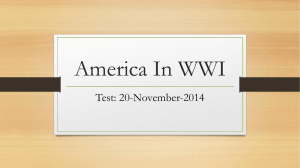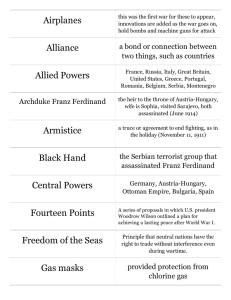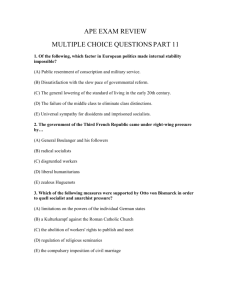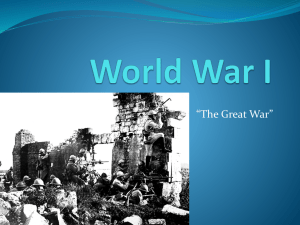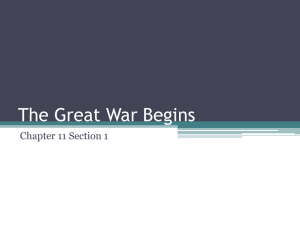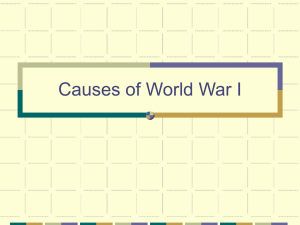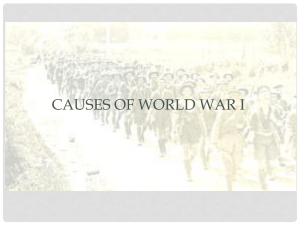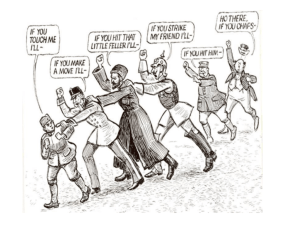Causes of World War One Essay Outline Thesis: There were many
advertisement
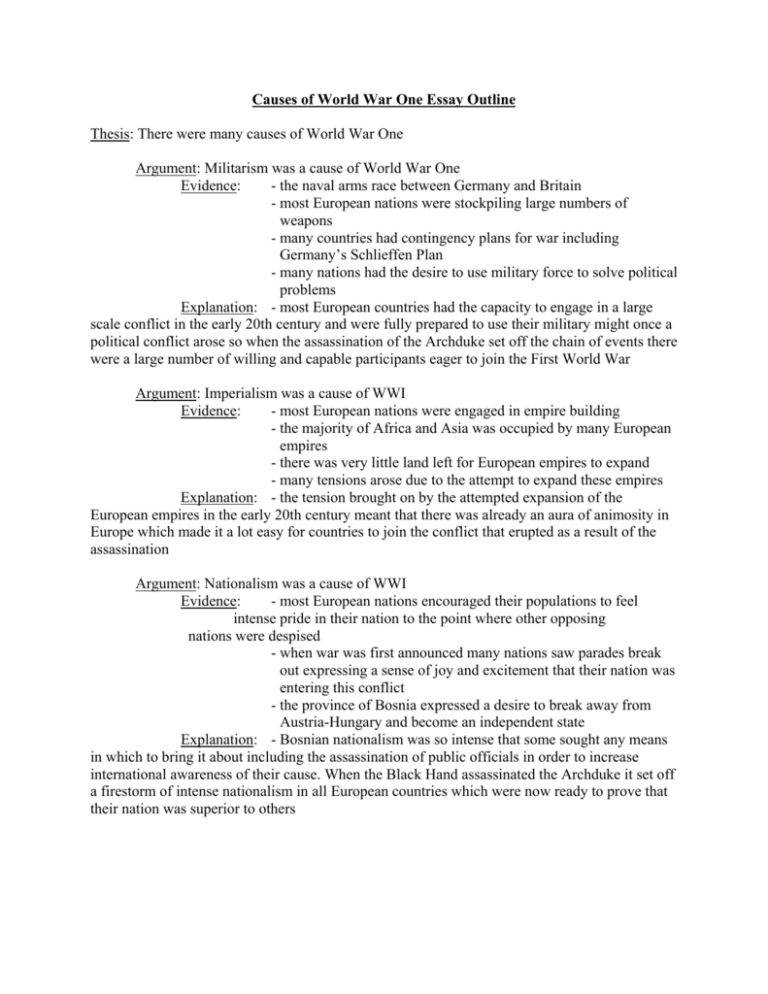
Causes of World War One Essay Outline Thesis: There were many causes of World War One Argument: Militarism was a cause of World War One Evidence: - the naval arms race between Germany and Britain - most European nations were stockpiling large numbers of weapons - many countries had contingency plans for war including Germany’s Schlieffen Plan - many nations had the desire to use military force to solve political problems Explanation: - most European countries had the capacity to engage in a large scale conflict in the early 20th century and were fully prepared to use their military might once a political conflict arose so when the assassination of the Archduke set off the chain of events there were a large number of willing and capable participants eager to join the First World War Argument: Imperialism was a cause of WWI Evidence: - most European nations were engaged in empire building - the majority of Africa and Asia was occupied by many European empires - there was very little land left for European empires to expand - many tensions arose due to the attempt to expand these empires Explanation: - the tension brought on by the attempted expansion of the European empires in the early 20th century meant that there was already an aura of animosity in Europe which made it a lot easy for countries to join the conflict that erupted as a result of the assassination Argument: Nationalism was a cause of WWI Evidence: - most European nations encouraged their populations to feel intense pride in their nation to the point where other opposing nations were despised - when war was first announced many nations saw parades break out expressing a sense of joy and excitement that their nation was entering this conflict - the province of Bosnia expressed a desire to break away from Austria-Hungary and become an independent state Explanation: - Bosnian nationalism was so intense that some sought any means in which to bring it about including the assassination of public officials in order to increase international awareness of their cause. When the Black Hand assassinated the Archduke it set off a firestorm of intense nationalism in all European countries which were now ready to prove that their nation was superior to others Argument: Alliances were a cause of WWI Evidence: - Europe was split into two armed camps - the Triple Alliance consisted of Germany, Austria-Hungary, and Italy - the Triple Entente consisted of Great Britain, France, and Russia - Russia and Serbia were long time Slavic allies - Great Britain, France, and Germany had agreed to protect Belgium in case of foreign intervention Explanation: - because the major powers of Europe had all agreed to come to the assistance of each other, any small conflict had the potential to turn into a world wide war. The Austro-Hungarian declaration of war on Serbia brought Russia and France into a conflict against Germany and Austria-Hungary. Once Germany invaded Belgium in order to attack France, Great Britain declared war on Germany. Concession: The assassination of Archduke Franz Ferdinand does play a significant role in starting WWI Evidence: - June 28, 1914 Gavrillo Princep, a crazed member of the terrorist group The Black Hand, will assassinate the heir to the Austro-Hungarian throne, Franz Ferdinand, after the driver of his car takes a wrong turn in Sarajevo, Bosnia - Austria-Hungary blames Serbia and issues a series of ultimatums and eventually declares war on Serbia - this declaration of war eventually leads to the outbreak of WWI Defeat of the Concession: - the only way that the assassination can lead to the war is if there was already a series of pre-conditions in place. Other countries will only enter the conflict due to their alliances with other participants. Countries would only be eager to join the war if they were engaged in intense nationalism. The war could only spread if there was already an atmosphere of tension due to the many conflicts of imperialism. Countries would only be interested in participating in this war if they saw war as an extension of politics and had a ready arsenal of weapons to use in the conflict. Best Body Paragraph The most significant of the indirect causes of World War One had to be the complex alliance system that was in place prior to the outbreak of the war. By the early 20th century, Europe saw itself in two armed camps. On one side the Triple Alliance was established between Germany, Austria-Hungary, and Italy. In opposition to them was the Triple Entente made up of Great Britain, France and Russia. Russia also had very close ties to Serbia due to their common Slavic heritage. As well, Great Britain, France, and Germany had all agreed to come to the assistance of Belgium if it was ever invaded by a foreign power. Once Austria-Hungary declared war on Serbia, Russia immediately came to Serbia’s assistance. Russia’s entry then triggered the alliance between Germany and Austria-Hungary as the former came to the aid of the latter. This potential imbalance was then corrected by France’s entry into the war on the side of Russia. In order to attack France, Germany had entered into Belgian territory which triggered Britain’s response which was a declaration of war against Germany. Had it not been for these complex alliances, the assassination would only have brought about a war between Austria-Hungary and Serbia. It was the alliance system that turned a small conflict into World War One. Concession One would have to admit that the assassination does play a significant role in starting the First World War. On June 28th, 1914, Gavrillo Princep, a crazed member of the terrorist group The Black Hand, would assassinate the heir to the Austro-Hungarian throne, Franz Ferdinand, after his driver takes a wrong turn in Sarajevo, Bosnia. Immediately Austria-Hungary blamed Serbia for the assassination and issued a series of ultimatums. Austria-Hungary used these ultimatums as an excuse to declare war on Serbia. Once this war was declared it was not long before Russia, Germany, France, and Great Britain turned this conflict into World War One. However, it could only become a world war because of the pre-existing conditions that were in place in Europe at that time. It was the alliance system that increased the membership of this conflict. Also, the other countries were only interested in joining because they had a belief in using one’s military to solve political problems and had a ready supply of weapons to let loose on their enemies. As well, the war could only take place because of the increased tension in Europe due to a large number of conflicts due to Imperialism. Finally, countries would only want to fight if they truly believed in the greatness of their nations and the desire to prove themselves against the other countries of Europe. The assassination of Franz Ferdinand should have only been a small side note in European history, but because of a series of indirect causes it became the catalyst of World War One.
